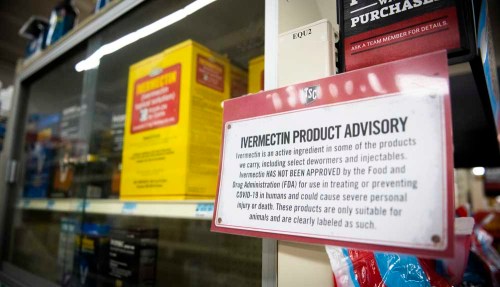Officials warn against horse dewormer for COVID-19; Valley stores report uptick in interest
Published 4:00 pm Sunday, August 29, 2021

- A warning sign about ivermectin at Tractor Supply Co. in Walla Walla Friday, Aug. 28, 2021.
WALLA WALLA — “You are not a horse. You are not a cow. Seriously, y’all. Stop it.”
This was the warning issued by the U.S. Federal Drug Administration on Saturday, Aug. 21, after a spike in reports that Americans are using ivermectin, an anti-parasitic drug commonly used to deworm horses and cows, in a misguided attempt to treat COVID-19.
Trending
“The FDA has received multiple reports of patients who have required medical support and been hospitalized after self-medicating with ivermectin intended for horses,” the federal agency wrote in a consumer report last week.
Walla Walla Valley businesses on both sides of the Washington-Oregon border have reported that residents here also are buying the oral formulation — there are injectable and pour-on forms as well — of the deworming drug for off-label purposes.
Overhanging shelves stocked with the anti-parasitic drug in Walla Walla’s Tractor Supply Company is a sign warning customers against using the drug to treat COVID-19.
“We have had people call asking for us to give dosage amounts for nonanimals,” said a worker at Milton-Freewater Ranch and Home who asked not to be named. “Basically so they could use it on themselves.”
Businesses could face legal liability if they knowingly provided ivermectin to a customer who intended to use it on themselves, the worker said.
Other businesses stated that, while they wouldn’t advise anyone on how to use the dewormer on themselves, they couldn’t stop customers from purchasing the drug.
Trending
“I think it’s stupid they’re doing that,” said the owner of Bordertown in Milton-Freewater, who also declined to be named for this story. “But that’s their deal, not mine.”
Interest in the off-label use of ivermectin has resulted in a spike of calls to poison control centers throughout the country. In 2020, the Washington Poison Center received around nine calls for ivermectin, said Dr. Scott Phillips, medical director for the WAPC. So far in 2021, the agency has received 26 calls, nearly three times as many, including 10 just in August.
Phillips is quick to note that, while the increase in calls is sizable, the overall call volume still is very low. Of the calls the agency has received regarding ivermectin, around one-third were simply calls for drug information, not reporting a poisoning.
“We really haven’t had any life-threatening reactions yet, but that doesn’t mean that you can’t,” Phillips said.
Ivermectin is not an anti-viral drug, according to the FDA, and oral tablets only are approved for human use at very specific doses for some parasitic worms. Taking a large dose of the drug can cause serious harm, the FDA warns, and veterinary formulations of ivermectin are very different from the drugs prescribed to human patients.
While some initial research is underway on the uses of ivermectin in COVID-19 patients, the agency cautions that taking a drug for an unapproved use can be very dangerous.









